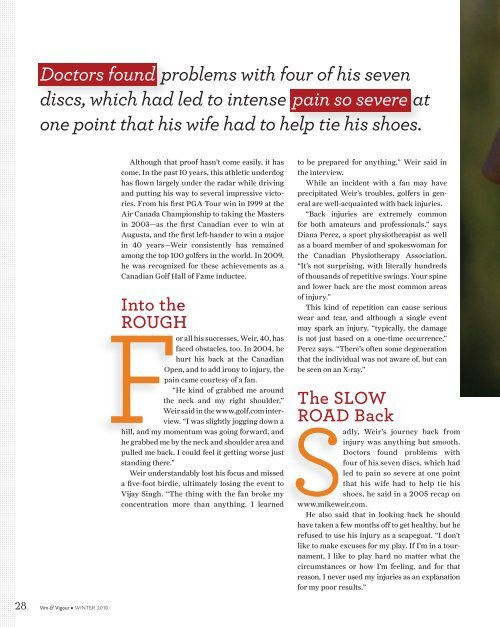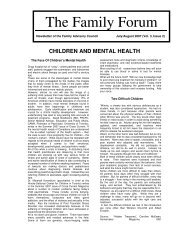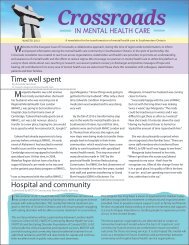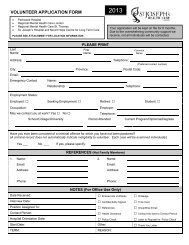Winter 2010 - St. Joseph's Health Care London
Winter 2010 - St. Joseph's Health Care London
Winter 2010 - St. Joseph's Health Care London
Create successful ePaper yourself
Turn your PDF publications into a flip-book with our unique Google optimized e-Paper software.
28<br />
Doctors found problems with four of his seven<br />
discs, which had led to intense pain so severe at<br />
one point that his wife had to help tie his shoes.<br />
Vim & Vigour · WINTER <strong>2010</strong><br />
Although that proof hasn’t come easily, it has<br />
come. In the past 10 years, this athletic underdog<br />
has fl own largely under the radar while driving<br />
and putting his way to several impressive victories.<br />
From his fi rst PGA Tour win in 1999 at the<br />
Air Canada Championship to taking the Masters<br />
in 2003—as the fi rst Canadian ever to win at<br />
Augusta, and the fi rst left-hander to win a major<br />
in 40 years—Weir consistently has remained<br />
among the top 100 golfers in the world. In 2009,<br />
he was recognized for these achievements as a<br />
Canadian Golf Hall of Fame inductee.<br />
Into the<br />
ROUGH or all his successes, Weir, 40, has<br />
faced obstacles, too. In 2004, he<br />
hurt his back at the Canadian<br />
Open, and to add irony to injury, the<br />
pain came courtesy of a fan.<br />
“He kind of grabbed me around<br />
the neck and my right shoulder,”<br />
Weir said in the www.golf.com interview.<br />
“I was slightly jogging down a<br />
hill, and my momentum was going forward, and<br />
he grabbed me by the neck and shoulder area and<br />
pulled me back. I could feel it getting worse just<br />
standing there.”<br />
Weir understandably lost his focus and missed<br />
a fi ve-foot birdie, ultimately losing the event to<br />
Vijay Singh. “The thing with the fan broke my<br />
concentration more than anything. I learned<br />
to be prepared for anything,” Weir said in<br />
the interview.<br />
While an incident with a fan may have<br />
precipitated Weir’s troubles, golfers in general<br />
are well-acquainted with back injuries.<br />
“Back injuries are extremely common<br />
for both amateurs and professionals,” says<br />
Diana Perez, a sport physiotherapist as well<br />
as a board member of and spokeswoman for<br />
the Canadian Physiotherapy Association.<br />
“It’s not surprising, with literally hundreds<br />
of thousands of repetitive swings. Your spine<br />
and lower back are the most common areas<br />
of injury.”<br />
This kind of repetition can cause serious<br />
wear and tear, and although a single event<br />
may spark an injury, “typically, the damage<br />
is not just based on a one-time occurrence,”<br />
Perez says. “There’s often some degeneration<br />
that the individual was not aware of, but can<br />
be seen on an X-ray.”<br />
The SLOW<br />
ROAD Back<br />
adly, Weir’s journey back from<br />
injury was anything but smooth.<br />
Doctors found problems with<br />
four of his seven discs, which had<br />
led to pain so severe at one point<br />
that his wife had to help tie his<br />
shoes, he said in a 2005 recap on<br />
www.mikeweir.com.<br />
He also said that in looking back he should<br />
have taken a few months off to get healthy, but he<br />
refused to use his injury as a scapegoat. “I don’t<br />
like to make excuses for my play. If I’m in a tournament,<br />
I like to play hard no matter what the<br />
circumstances or how I’m feeling, and for that<br />
reason, I never used my injuries as an explanation<br />
for my poor results.”










